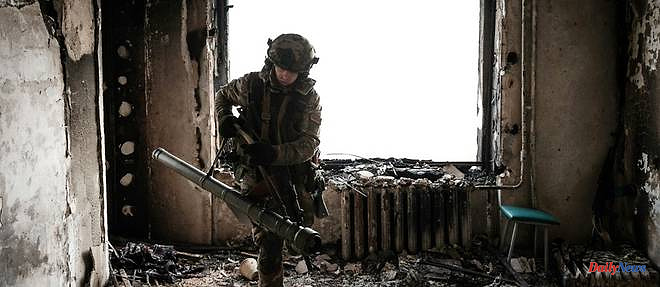A wailing siren, an ambulance speeds towards a triage center for wounded Ukrainian soldiers outside Bakhmout (east), the scene of the longest and bloodiest battle since the start of the Russian invasion.
Ivan, an ambulance driver, waits by the side of the road for the arrival of more and more wounded as the fighting gets tougher. Striped with trenches, pounded by artillery, the battlefield reminded him of the First World War. "Over there, it's like Verdun," he sighs.
As in 1916 in eastern France, the Battle of Bakhmout was extremely violent and deadly. Its outcome has become a symbolic issue as the first anniversary of the start of the war, February 24, approaches.
Moscow wants to secure its first significant victory after months of setbacks, but kyiv is determined to hold on. And as both sides entrench themselves, the human cost, to troops and civilians alike, has overshadowed the strategic importance of controlling this crumbling former industrial city in its eastern, northern and southern quarters.
"It's a classic World War I problem," said Mark Cancian, an analyst with the US think tank CSIS (Center for Strategic and International Studies).
After the failure of the first Russian attempts to surround the Ukrainian forces in Bakhmut, Moscow "continued to attack" even if a victory "would mean nothing in military and strategic terms".
"There's a lot of symbolism so if they capture Bakhmout they'll pretend it's important, but it's not," said the former Marines officer, who concedes Ukraine's options are limited.
"If that's where the Russians are attacking, the Ukrainians have no choice but to defend" the city, he said.
According to British intelligence, the Russian advance has been halted but the pressure remains. On Sunday, the Russian paramilitary group Wagner claimed responsibility for taking Krasna Hora, a few kilometers north of Bakhmout.
What justify the repeated calls of Ukrainian President Volodymyr Zelensky to receive more weapons from Western countries.
"If the delivery of weapons accelerates, especially long-range weapons, not only will we not withdraw from Bakhmout, (but) we will start to end the occupation of Donbass", assured - he at the beginning of February before several senior European officials gathered in Kiev.
The army will defend Bakhmout "as long as it can", he insisted.
But this battle is not just about high-precision weapons. For Oleksandre Kovalenko, a Ukrainian military analyst, kyiv mainly needs to receive standard artillery and ammunition. "If that doesn't happen, then we will have serious problems in Bakhmout," he told AFP.
On the ground, Ukrainian soldiers express the same need.
"The enemy has a huge advantage in artillery," Yuri Kryjbersky, a 37-year-old officer, told AFP at the end of January: "You can sit in a cellar in Vassioukivka (a village north of Bakhmout also on the front line, editor's note) for half an hour and hear 40 shells go by".
The other Russian advantage is the number, which impresses this Ukrainian sergeant responding to the nom de guerre of Alkor: "We shoot, we shoot and we shoot but after five minutes, 20 additional men arrive in front of us".
Moscow and Wagner are notably accused of using ill-prepared recruits as "cannon fodder", a claim rejected by Russian military analyst Alexander Khramchikhine, who sees it as "Western propaganda".
However, kyiv also suffered heavy losses. Major Volodymyr Leonov, of the Ukrainian territorial defense forces, claims to have had a dozen wounded in his ranks in three days in January. And five of his soldiers, killed, could not be recovered.
"Our guys are motivated, everyone has come to fight," he told AFP: "But when there is no artillery support, there is no tanks, you just get shot at, like in a shooting range".
No camp communicates on its losses but Ukrainians as Russians describe the battle of Bakhmout as the bloodiest of the war. Near the northern front, AFP saw at the end of January a dozen bodies presented as those of members of Wagner, lying abandoned on the frozen ground.
"Apparently, they had no right to retreat", comments Vladislav, a Ukrainian soldier: "They had not even recovered their wounded. And in the end they died here, in the fields".
Alongside the clashes on the ground, a war of words is raging between Ukrainians and Russians.
Denis Pushilin, the pro-Russian leader of the Donetsk region, recently spoke of the "liberation of Artemovsk", referring to Bakhmut with the name used in Soviet times until 2016.
At the end of December, while visiting this city which once had 70,000 inhabitants and was known for its salt mines and its sparkling wine, Volodymyr Zelensky had meanwhile mentioned the "Bahmut fortress".
Finally, for Evguéni Prigojine, Wagner's boss, the "fierce" fighting in the northern districts of Bakhmout takes place in "every street, every house, every stairwell".
Burning buildings, remains of shells or bloody snow strewn with human flesh: the signs of the fighting in the besieged city are indeed visible almost everywhere.
According to the authorities, more than half of the buildings in Bakhmout have been destroyed. The bridge that crosses the small river crossing the city is nothing more than a tangle of planks, tires and pallets.
Natalia Shevchenko, who uses it every day to fetch drinking water, has become accustomed to the whistling of shells.
"I live in the cellar at the moment. When I go out, I'm like a mole, my eyes have to get used to the light", says this resident, one of the 6,500 people who have chosen to stay in Bakhmout.
New civilians have left since the fighting intensified, says Tetiana Chtcherbak, a volunteer at a humanitarian center. At the starting point of the evacuations, some wait all night, huddled next to the stoves with a few makeshift objects.
Others came out of their homes by volunteers braving the bombardments and sometimes finding themselves in the center of the fighting.
Survival, then, "is a matter of luck," said Mykola, a 24-year-old volunteer he met in Kiev at a ceremony in honor of one of the two British volunteers killed in Soledar in January.
In early February, another foreign aid worker, American Pete Reed, died in Bakhmout.
Natalia Yevtouchenko, 38, tried twice to leave the city.
The first time, in April, his 16-year-old son was killed along with 60 other civilians by a missile that hit the train station in Kramatorsk, the main Kiev-controlled city in the region.
The second time, she had a car accident. “I tried enough,” she says.
She is now a volunteer in one of the humanitarian centers in Bakhmout, where she feeds and warms the population while the winter makes this already precarious existence even more difficult.
In the trenches on the periphery, the troops do not have this support. They endure the freezing cold by clinging to candles made by volunteers, in the snow and mud, peering into no man's land and sometimes without sleep for several days in a row.
Ukrainian forces are preparing for a new assault, digging new trenches to try to contain the Russian offensive.
In Sloviansk, about fifty kilometers to the northwest, another of theirs is buried in the frozen earth. The funeral is that of Oleksandr Korovny, 28, a member of the Azov battalion killed in Bakhmout.
A friend, Oleksiï Storoj, gestures towards a nearby World War II memorial. "History repeats itself," he said, "what's the point of all this?"
13/02/2023 04:55:13 - Bakhmout (Ukraine) (AFP) - © 2023 AFP












